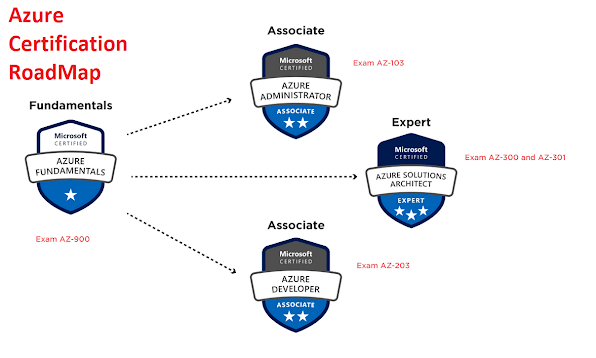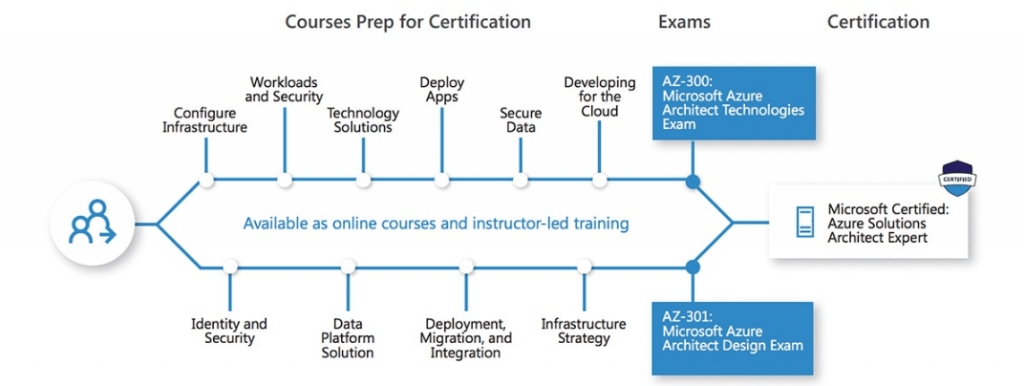
- Introduction to Azure Solutions Architecture
- Role and Responsibilities of an Azure Solutions Architect
- Microsoft Certifications for Azure Architects
- Prerequisites and Required Skills
- AZ-305 Exam Overview and Topics
- Study Resources for AZ-305 Exam
- Hands-on Experience and Project Implementation
- Cloud Security and Compliance Considerations
- Real-World Use Cases of Azure Solutions Architect
- Salary Trends for Azure Solutions Architects
- Job Opportunities and Career Growth Path
- Conclusion
Introduction to Azure Solutions Architecture
Microsoft Azure is one of the leading cloud platforms enterprises use for building, deploying, and managing applications. As businesses migrate to the cloud, Azure Solutions Architects are pivotal in designing and implementing scalable, secure, high-performance cloud solutions. Microsoft Azure Training professionals translate business requirements into technical solutions using Azure’s cloud infrastructure and services. An Microsoft Azure Solutions Architect needs to possess a deep understanding of the various components of Azure and the ability to design reliable, scalable, and cost-effective systems. This role requires the ability to integrate and configure Azure services, ensure security compliance, and provide solutions that align with organizational needs.
Role and Responsibilities of an Azure Solutions Architect
An Azure Solutions Architect is responsible for designing and managing cloud infrastructure solutions on Microsoft Azure. Their primary role is to ensure that cloud architecture is efficient, reliable, and secure while aligning with business objectives. Here’s a breakdown of the typical responsibilities:
- Designing Cloud Solutions: The architect creates end-to-end solutions on Azure, considering performance, scalability, availability, and cost-effectiveness. They must ensure that the solutions meet the business’s needs.
- Evaluating Business Requirements: Understanding the client’s business goals and translating them into technical architecture is crucial to the role. Azure architects work closely with business stakeholders to ensure that the cloud solutions align with business objectives.
- Azure Infrastructure Management: Microsoft Certification Path manage the setup and configuration of Azure services, including virtual machines, databases, networking, and storage, while optimizing the architecture for better performance and cost savings.
- Ensuring Security: A significant part of the architect’s role is ensuring that all Azure solutions comply with organizational security policies, industry standards, and legal requirements.
- Collaboration with Other Teams: Azure architects often collaborate with other professionals, including developers, system administrators, and security engineers, to ensure the cloud solutions are implemented smoothly and efficiently.
- Cost Management: They are tasked with optimizing the solution to ensure it fits within the budget while maintaining high performance and scalability. Azure’s pricing model is complex, and the architect must be able to control costs effectively.
- Documentation: Clear documentation is crucial to ensure that the architecture is understandable to others and that it can be easily maintained, updated, and scaled.
- Troubleshooting and Optimization: After deployment, Azure architects continually monitor and optimize cloud solutions to ensure that they perform at their best and resolve any issues that arise.
Ready to Pursue Your Microsoft Azure Certificate? View The Microsoft Azure Course Offered By ACTE Right Now!
Microsoft Certifications for Azure Architects
Microsoft offers various certifications to help Azure professionals showcase their skills. One of the most relevant certifications for Azure solutions architects is the Microsoft Azure Solutions Architect Expert. Certification Path To earn the Azure Solutions Architect Expert certification, candidates must pass the AZ-305 exam. Before taking the AZ-305, it’s often recommended to have some foundational knowledge of Azure, typically through the AZ-900 certification, which focuses on basic Azure concepts. Microsoft Certified Azure Fundamentals (AZ-900) An essential certification for beginners that covers foundational Azure Certification Roadmap concepts. Microsoft Certified Azure Administrator Associate (AZ-104) covers the management of Azure services, including virtual networks, storage, and resources, and is helpful for those aspiring to become Solutions Architects.

Prerequisites and Required Skills
To become an Azure Solutions Architect, there are several key prerequisites and skills required:
- Fundamental Cloud Knowledge: Before diving into advanced Azure concepts, you should have a solid understanding of cloud computing, including the different service models (IaaS, PaaS, SaaS) and deployment models (public, private, hybrid).
- Experience with Azure Services: You need to be well-versed with core Azure services such as Azure Compute (Virtual Machines, Azure App Services), Azure Storage (Blob Storage, File Storage), Azure Networking (Virtual Networks, Load Balancers, VPN Gateway), Azure Databases (SQL Database, Cosmos DB), Azure Security (Azure Security Center, Identity and Access Management)
- Designing Solutions: You should have experience designing architectures that balance the trade-offs between cost, scalability, performance, and security.
- Security and Compliance: Microsoft Azure Training is critical to have a good understanding of cloud security and compliance best practices, including identity and access management (IAM), firewalls, encryption, and regulatory compliance (GDPR, HIPAA).
- DevOps & Automation: Familiarity with DevOps practices and automation tools like Azure DevOps and ARM templates is essential for implementing automated, repeatable deployments and continuous integration/continuous deployment (CI/CD) pipelines.
- Soft Skills: Strong communication, leadership, and problem-solving skills are necessary to collaborate with different teams and present solutions to business stakeholders.
AZ-305 Exam Overview and Topics
The AZ-305 exam, Designing Microsoft Azure Infrastructure Solutions, is a key requirement for becoming a Microsoft Certified Azure Solutions Architect Expert. It tests a candidate’s ability to design and implement solutions on Azure.The exam is a comprehensive test that validates your ability to design and manage cloud solutions at an expert level. Become Devops Engineer requires technical knowledge and the ability to make architectural decisions based on business requirements.
Key Topics Covered in the AZ-305 Exam:
- Designing Azure Compute Solutions: Planning and creating virtual machines, app services, containers, and serverless computing.
- Designing Azure Storage Solutions: Designing storage accounts, file storage, and data lakes. This also includes developing solutions for backup and disaster recovery.
- Designing Azure Networking Solutions: Designing network architecture, including virtual networks, VPNs, ExpressRoute, load balancing, and DNS.
- Designing Identity and Security Solutions: Designing secure identity and access management solutions, including multi-factor authentication (MFA) and role-based access control (RBAC).
- Designing Monitoring and Governance Solutions: Implementing monitoring and logging solutions for performance management and ensuring policy compliance.
- Designing for Business Continuity and Disaster Recovery: Ensuring the solution is resilient and can withstand disruptions or disasters.
- Identity and Access Management (IAM): Use Azure Active Directory to manage identities and access control.
- Data Encryption: Protect sensitive data in transit and at rest using Azure’s encryption services.
- Network Security: Implement network security controls such as VPNs, firewalls, and network segmentation.
- Compliance: Using Azure’s compliance offerings, design solutions that meet regulatory requirements such as GDPR, HIPAA, and ISO standards.
- E-commerce Platform: An Microsoft Azure Portal Architect might design an e-commerce platform with high availability, disaster recovery, and scalability to handle unpredictable traffic surges during peak shopping seasons.
- Hybrid Cloud Strategy: Many enterprises adopt a hybrid cloud model to integrate on-premises systems with cloud infrastructure. An Azure architect would design the cloud solutions to integrate smoothly with existing on-prem resources.
- Data Lakes and Big Data: For organizations dealing with large amounts of data, Azure architects design data lake solutions using Azure Data Lake Storage and implement data pipelines for big data processing and analysis.
- Disaster Recovery Solutions: Azure Solutions Architects also design disaster recovery strategies, ensuring critical applications remain available during an outage or failure.
- Entry-level Azure Solutions Architects earn between $90,000 and $120,000 annually.
- Experienced professionals with 5-10 years of experience can earn anywhere from $130,000 to $160,000 annually.
- Senior-level Azure Solutions Architects in specialized industries or large enterprises can earn upwards of $180,000 annually.
- Cloud Architect: Focusing on broader cloud architecture solutions that may involve multiple cloud providers.
- Cloud Security Architect: Specializing in designing secure cloud infrastructure and mitigating cyber risks.
- DevOps Architect: Combining Azure DevOps architecture expertise with automation and continuous integration practices.
- Cloud Consultant: Working as an external consultant for organizations seeking to migrate to Azure or optimize their cloud operations.
Interested in Obtaining Your Microsoft Azure Certificate? View The Microsoft Azure Online Course Offered By ACTE Right Now!
Study Resources for AZ-305 Exam
There are several study resources available to help prepare for the AZ-305 exam. Microsoft Learn official learning platform offers free, self-paced learning modules. These modules cover all the necessary topics for the AWS Vs Azure vs Google Cloud, combining theoretical lessons and hands-on labs. Various study guides are available, such as the Exam Ref AZ-305 Designing Microsoft Azure Infrastructure Solutions book, which provides a detailed breakdown of the exam objectives. Practice Exams One of the best preparation methods is to take practice exams. Microsoft offers official practice exams, and third-party providers like Whizlabs and MeasureUp also provide practice tests. Online Courses Platforms like Pluralsight, Udemy, and LinkedIn Learning offer Microsoft Azure Solutions Architect courses that cover the exam objectives. Community Resources Participating in forums such as Stack Overflow, Microsoft Tech Community, or Reddit can help clarify doubts and gain insights from others preparing for the same exam.
Hands-on Experience and Project Implementation
In addition to theoretical knowledge, hands-on experience is essential for successfully passing the AZ-305 exam. Building real-world projects using Azure services will provide practical insight into how various components integrate and work together. Some projects that can help develop hands-on experience, Deploying a multi-tier web application on Azure using Virtual Machines, Load Balancers, and Databases. Setting up Azure Active Directory for identity and access management. Implementing automated deployment pipelines using Azure Developer. Creating these solutions and troubleshooting issues during the setup process will deepen your understanding of Azure architecture and prepare you for the exam.
Interested in Pursuing Cloud Master’s Program? Enroll For Cloud Computing Master Course Today!
Cloud Security and Compliance Considerations
As an Microsoft Azure Solutions Architect , ensuring the security of cloud solutions is paramount. Security should be integrated throughout the design process, and Azure architects should always follow the “Security by Design” principle. Key considerations include:
Real-World Use Cases of Azure Solutions Architect

Salary Trends for Azure Solutions Architects
Salaries for Azure Solutions Architects can vary based on experience, geographical location, and organization.Additionally, those with Microsoft Certifications like AZ-305 and specialized skills such as cloud security or Azure DevOps experience tend to command higher salaries. In general:
Set to Ace Your Microsoft Azure Job Interview? Check Out Our Blog on Microsoft Azure Interview Questions & Answer
Job Opportunities and Career Growth Path
Azure Solutions Architects are in high demand due to the increasing adoption of Azure Active Directory B2C. Organizations across industries, such as finance, healthcare, and retail, are actively hiring Azure professionals to build and manage their cloud infrastructure. Career growth paths for Azure Solutions Architects can include:
Conclusion
Becoming an Microsoft Azure Training Solutions Architect offers a rewarding career with vast growth opportunities. As more businesses migrate to the cloud, the demand for skilled professionals who can design, implement, and manage Azure solutions continues to rise. By obtaining Microsoft Certifications like the AZ-305, gaining hands-on experience, and staying up-to-date with the latest cloud technologies, you can set yourself up for success in this fast-evolving field. Azure Solutions Architects not only play a crucial role in helping businesses harness the power of cloud computing but also have significant potential for career advancement and high earning potential.





